As this year’s edition of the Chicago International Film Festival winds down, I’ve completed my screenings for 2023. I viewed seven films in all, which is considerably fewer than in recent years, for a variety of reasons (cost, venues, programming), and I must admit I’m coming away from the event somewhat disappointed. This was not one of CIFF’s better efforts, both for the foregoing reasons and for some staging and logistical issues that left much to be desired, especially given a hefty increase in ticket prices. And, as for the films I watched, with two exceptions, I was somewhat underwhelmed by them (somewhat ironic given that the ones I liked most were the first two screenings I attended – what a letdown considering what followed).
With that said, then, here’s what I watched and what I thought of those films:
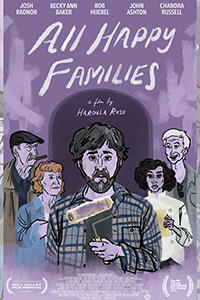
“All Happy Families” (USA)
(5/5); Letterboxd (4.5/5), Imdb.com (9/10), TMDB.com (4.5/5); Web site
Movie portrayals of family life often leave much to be desired when it comes to authenticity (especially for offerings on the Hallmark Channel). So it’s genuinely refreshing when a film comes along that depicts these stories with honesty while being eminently entertaining at the same time. Such is the case with writer-director Haroula Rose’s second feature outing about a dysfunctional Chicago family going through a variety of transitions that become ironically (and often hilariously) interconnected, all served up with sparkling wit and an excellent array of one-liners that are definite zingers without being hurtful or nasty. The construction of the narrative and its accompanying screenplay are meticulous and economical, moving along with a steadily sustained pace and never getting bogged down by prolonged sequences that languish or lose their zest, much in the style of director Nicole Holofcener’s works. All of this is brought to life by a finely assembled ensemble cast, especially its four principals (Josh Radnor, Rob Huebel, John Ashton and Becky Ann Baker) but also in its palette of intriguing supporting players. What’s more, the film does a superb job in its depiction of Chicago’s people and neighborhoods, presenting an authentic look and feel of the Windy City, one that residents of the Second City will relish and appreciate. “All Happy Families” is one of those offerings that aren’t widely seen (or made) anymore, but it’s one of the best I’ve screened in a long time. This charmer deserves a general release and a robust fan base. Let’s hope it gets both.

“The Hypnosis” (“Hypnosen”) (Sweden/Norway/France)
(4/5); Letterboxd (4/5), Imdb.com (8/10), TMDB.com (4/5) Web site Trailer
Sometimes we can all use a little help in changing our behavior when we aren’t able to do so on our own, and hypnosis is one of the most commonly employed practices. But, in some cases, it can work so well that we may unintentionally end up overcompensating, prompting us to act out in ways that yield a whole new crop of issues to contend with. Such is the case with Vera (Asta Kamma August), who gives hypnosis a try to quit smoking, a behavior she regards as unhealthy and antisocial. However, Vera’s hypnotherapist (Karin de Frumerie) suspects that her patient’s reluctance in explaining her reasons for seeking out treatment suggests that she’s there for more than just kicking the habit. This hunch leads her to conduct a profoundly impactful hypnotherapy session that produces a radical, albeit somewhat ill-defined, change in her subject’s behavior. And, even though Vera seems to relish the effects of this change, it couldn’t have come at a worse time: just as Vera and her business and romantic partner, André (Herbert Nordrum), are about to plug their new commercial venture to a group of select international investors at an elite pitch fest, an event where they receive guidance from a high-profile pitch coach (David Fukamachi Regnfors). During preparation for their presentation, Vera begins acting strangely unpredictably, even disorderly, toward others, including those whom she and André are most trying to win over. So what’s going on here? And what, if anything, can André do to salvage matters before everything falls apart? Writer-director Ernst De Geer’s delightfully quirky debut feature takes a humorously absurdist look at questions of social conformity, particularly when it comes to differentiating behavior that’s gleefully playful from that which is wholly unacceptable, especially in earnestly serious “grown-up” situations. It accomplishes this goal through a captivating mix of hilariously dry wit and cringeworthy drama, one that often makes viewers squirm while questioning exactly what’s going on. In fact, at times, the mix can be perplexing enough that audiences may be uncomfortably puzzled by what’s transpiring on the screen and what the director is going for – that is, until the surfacing of the big reveal, the one that exposes the source behind the emergence of Vera’s erratic behavior, one that plants a rollicking punctuation mark on this often-uproarious offering. Much of the credit for this goes to the film’s fine script and its superb ensemble cast, particularly protagonists August and Nordrum, who play off each other well and create a wry sense of humorously driven dramatic tension. I love movies that make it a point to stick pins in sanctimonious balloons and push over sacred cows, and this one does as good a job at that as I’ve seen in a while. “The Hypnosis” may not be everyone’s cup of tea, but I’m only too happy to take more than a few good sips. Pass the milk and lemon, please.
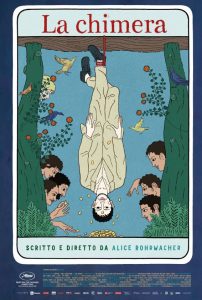
“La Chimera” (“The Chimera”) (Italy/France/Switzerland)
(3/5); Letterboxd (3.5/5), Imdb.com (7/10), TMDB.com (3.5/5); Web site Film clip
When an English tomb raider (Josh O’Connor) skilled at dowsing uses his skills to hunt down buried Etruscan artifacts, he achieves success at his craft but suffers setbacks when he falls in with the wrong crowd. As a consequence, he drifts through life, trying to find his way (and, ironically enough, a moral footing), an odyssey filled with quirky people and events, a would-be romantic interest (Carol Duarte) with two carefully concealed children, an aging operatic instructor (Isabella Rossellini) skilled at fleecing her “students,” and, of course, his coterie of comical criminal cronies. Writer-director Alice Rohrwacher’s latest tells a delightful fable full of wit, whimsy, colorful characters, high intrigue and its share of surreal moments, all set against the Italian landscape. The film admittedly takes a little time to find its stride, so getting through the opening act will require some patience (editing here would have helped). But, once the picture finds its way, it becomes a fun-filled ride, peppered with absurdist humor and filmed with Fellini-esque cinematography and a production design reminiscent of the famed auteur. With a runtime of 2:10:00, it could stand some trimming (most notably at the outset, as noted above), but this cinematic charmer is a modestly pleasant diversion to watch while stretched out on the couch casually savoring a demitasse of espresso and a plate of biscotti. Godere!
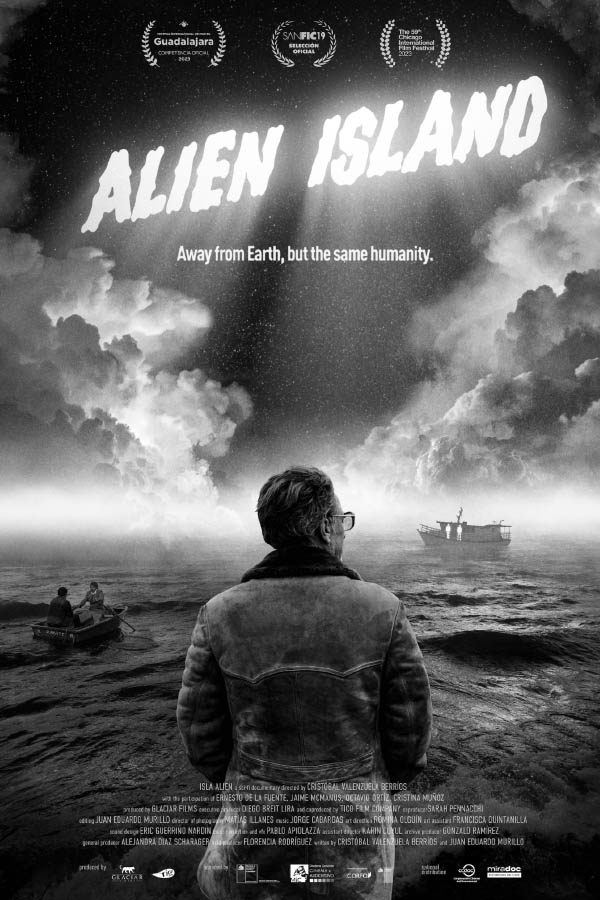
“Alien Island” (“Isla Alien”) (Chile/Italy)
(3/5); Letterboxd (3/5), Imdb.com (6/10), TMDB.com (3/5); Web site Trailer
Urban legends have a way of taking on lives of their own. So it was in Chile in the mid-1980s, when a group of ham radio operators intercepted messages from witnesses who claimed to have seen and interacted with a collective of benevolent, highly advanced extraterrestrials (members of a Pleiadian “congregation” known as “Friendship”) on a remote island off the nation’s far southern coast. But where was the definitive proof of this? The radio messages were about the only available “evidence,” and attempts by investigators to visit Friendship Island always fell through. What’s more, as all of this was unfolding, the nation was in the grips of the authoritarian dictatorship of Augusto Pinochet, a ruling junta known for creating an atmosphere of suspicion and paranoia and frequently spreading disinformation. So what was really going on here? That’s what writer-director Cristóbal Valenzuela Berríos has sought to expose in this highly stylized black-and-white documentary about the fabled, enigmatic Friendship incident. Presented very much in the style of cheesy, campy 1950s horror flicks, the film combines audio recordings of the original ham radio messages, interviews with the short-wave operators who intercepted them, expert opinions from contemporary ufologists and re-enactments of the alleged alien encounters, punctuated by clips from 1990s Chilean TV specials about the incident and select scenes from vintage, low-budget creature features for comic enhancement. However, as well as the film integrates these elements, as the story plays out, it loses some of the humorous, stylistic punch with which it opens, becoming somewhat more mundane and drawn out as its theories about what really happened are explained, moving forward in an increasingly plodding, subdued manner. This portion of the narrative also tends to place too much emphasis on some aspects of its explanation while seriously underplaying others, an issue that undercuts the true impact of its revelations. It’s unfortunate that this offering ultimately progresses as it does, especially since it has a good thing going for it at the outset. Regrettably, though, as one of the screenings I most looked forward to at this year’s festival, instead of mesmerizing me, “Alien Island” merely left me modestly amused and somewhat underwhelmed.
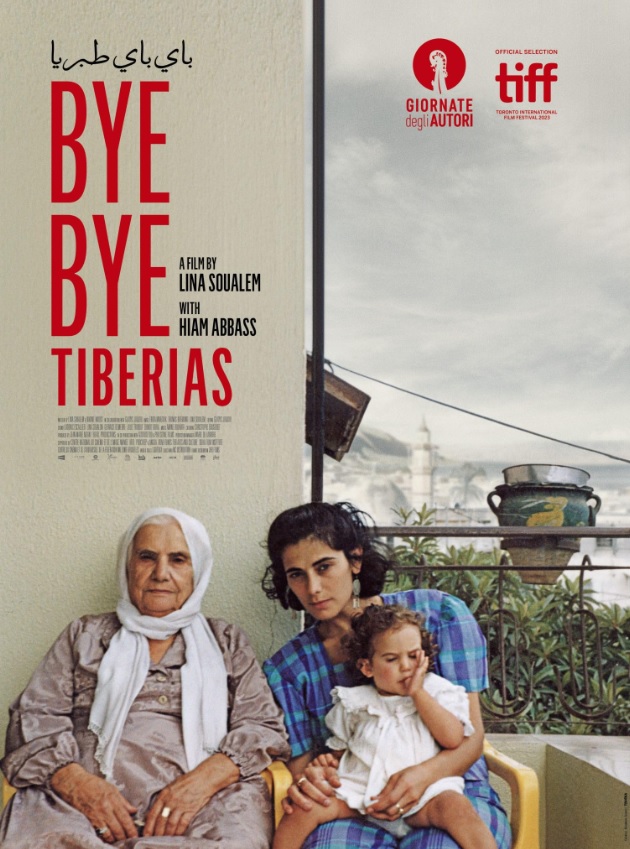
“Bye Bye Tiberias” (“Bye Bye Tibériade”) (France/Palestine/Belgium/Qatar)
(3/5); Letterboxd (3/5), Imdb.com (6/10), TMDB.com (3/5); Web site Trailer
Memorializing one’s family history is an exercise that can provide a valuable record of our relatives’ past and establish the legacy that has carried through the years to the present day. It can also teach us much about what distinguishes one’s kindreds in terms of their characteristics, accomplishments and values. The impact of that can be quite revelatory, too, producing a chronicle of inspiring insights and profound achievements of one’s relations, especially those that emerged in the face of challenge, adversity and cultural limitations. In her second documentary feature, director Lina Soualem has sought to capture a loving record of those qualities in this highly personal film that charts the lives of four generations of her family’s women, including herself, her mother (Emmy-nominated actress Hiam Abbass), her grandmother and her great-grandmother. The picture primarily follows the experiences of the filmmaker’s three ancestral generations during their lives in their Palestinian homeland from the days of the creation of Israel in 1948 to the time of Abbass’s emigration to France, where she began her acting career and gave birth to her daughter. In doing so, the film juxtaposes the family’s individual history with that of the larger cultural backdrop against which their story is set. It also provides viewers with a look at the actress’s return to Palestine with her daughter after a prolonged absence, a time of remembrance and reflection. As touching and uplifting as this story can be, however, there are times when it starts to play more like a highly polished home movie than a theatrical documentary. It also would have benefitted from a deeper look at the historical back story and how its events helped shape the lives of these courageously determined women. That’s particularly true in the wake of recent developments (even though this film was made before them), given that the inclusion of such background material would have leant a more profound understanding to the longstanding prevailing circumstances in Palestine and the role that they played in the unfolding of this family’s story. Moreover, the film seems to puzzlingly downplay Abbass’s career accomplishments, achievements that marked a key turning point in the family’s history, one specifically inspired by her yearning to leave the “suffocating” conditions of life in her homeland. Soualem certainly deserves kudos for her attempt to deftly mesh personal and cultural considerations in this film, her heart clearly in the right place. However, the overall mix doesn’t quite gel as well as it could have, leaving viewers with a story that may be moving and poetic but that somehow feels somewhat incomplete. Perhaps that comes from being too close to the material, no matter how sincere one’s intents might be – and how earnestly one wants to see those goals fulfilled.
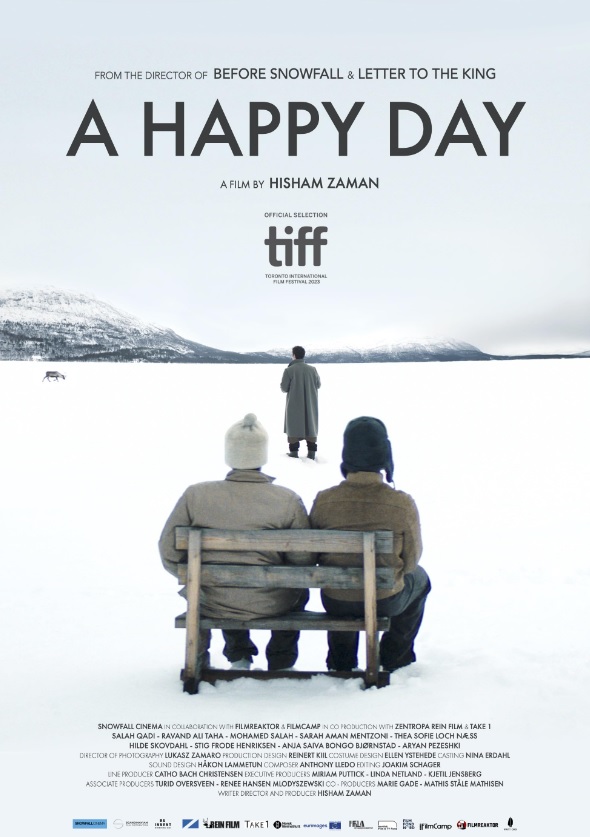
“A Happy Day” (Norway/Denmark)
(2/5); Letterboxd (2.5/5), Imdb.com (5/10), TMDB.com (2.5/5); Web site Trailer
Fusing genres in a film project can be tricky business, as many failed and underwhelming cinematic examples have illustrated in recent years. And now writer-director Hisham Zaman can add his latest offering to that list. This absurdist comedy/romantic drama/coming of age tale profiles the stressful, uncertain lives of a group of teenage refugees who live in a government-run asylum camp in a remote region of Norway that’s perpetually covered in snow and frequently visited by wandering reindeer. They all nervously await their 18th birthdays, when they’ll be deported to their native countries, no matter how much they’ve come to embrace their newly adopted Nordic homeland. These conditions consequently yield a strange way of life, one riddled with anxiety, self-discovery and frequent attempts at running away (despite the harsh weather) in order to avoid the inevitable. However, while the film features its share of hilariously dry humor, moments of touching first love and profound drama, it doesn’t integrate them as well as they might have been. The narrative tends to meander, frequently switching tone and leaving viewers wondering what the filmmaker is going for, especially since grasping its meaning requires considerable audience foreknowledge of the circumstances being depicted. Some elements seem to come out of left field, too, many of which, according to the director, are intended to be poetic portrayals of these trying conditions. But these artistic aspects of the story often spring forth from obscure source materials that most viewers are unlikely to be familiar with. “A Happy Day” is obviously a meaningful, highly personal labor of love for the filmmaker, something that’s apparent in its stellar camera work, atmospheric score and fine performances by a cast of largely nonprofessional actors. Nevertheless, the material tends to come across as so “inside” that it’s frequently puzzling to those uninitiated in its unfamiliar subject matter and esoteric artistic references. Maybe this one will ultimately turn out to be a sensation in Oslo, but it’s not likely to play in Peoria – or virtually anywhere outside of Norway for that matter.
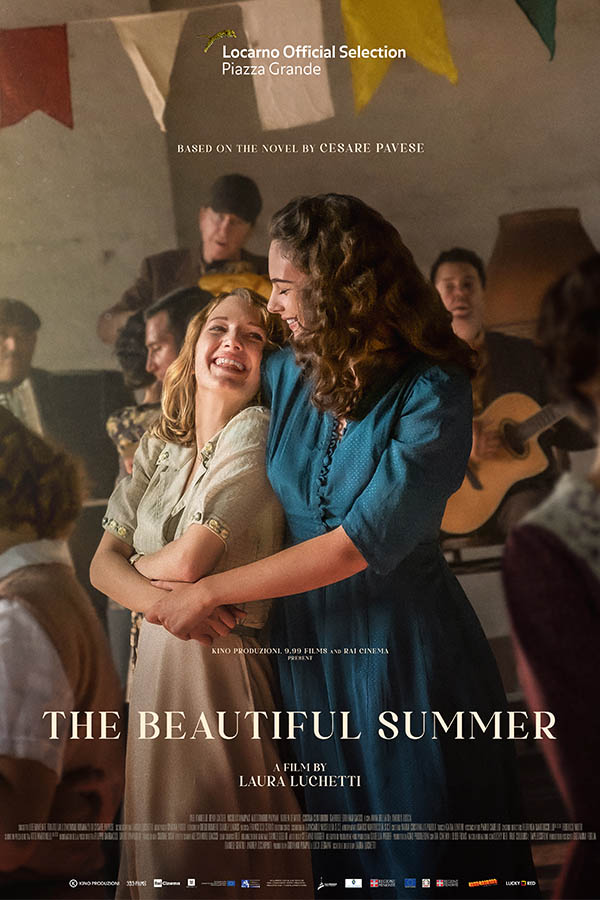
“The Beautiful Summer” (“La bella estate”) (Italy)
(2/5); Letterboxd (2/5), Imdb.com (4/10), TMDB.com (2/5); Web site Trailer
It’s frustrating to watch a film that’s ostensibly headed along a particular trajectory but that continually stumbles on the path it takes to get there. That’s precisely what happens in this period piece coming out/coming of age story set in 1938 Italy. Writer-director Laura Luchetti’s adaptation of Cesare Pavese’s 1949 novel about an impressionable 17-year-old dressmaker (Yile Yara Vianello) who becomes romantically infatuated with an artist’s model (Deva Cassel) takes its own sweet time (and plenty of overlong detours) in making its way toward a seemingly foregone conclusion. But, even when this offering apparently approaches that destination, it takes yet another unexpected left turn and subsequently leads to what the filmmaker herself admits is a deliberately ambiguous conclusion. Consequently, this is the kind of movie that’s likely to leave many viewers scratching their head and asking, “What’s the point of all this?” The picture is allegedly intended to address a subject that was considered taboo at the time of the story’s setting and of the book’s writing, but that objective isn’t fulfilled nearly as clearly as it might have been. As a result, whatever lofty intentions might have been behind the initiation of this production, they’re decidedly obscured in the final cut. There are also some passing references to the fascist sociopolitical conditions of the time (elements not included in the source material), but they’re never developed much, making their inclusion look like throwaway afterthoughts. To its credit, “The Beautiful Summer” has some fine cinematography, well-chosen location settings showcasing the beauty of Turin and a stirring soundtrack, but, if these attributes are the best that one can say about the film, that’s not saying much about the picture overall. Luchetti’s third feature outing truly needs ample retooling to make it work, because, as it stands, it doesn’t.
Copyright © 2023, by Brent Marchant. All rights reserved.

No comments:
Post a Comment